Back
El Salvador Sourcing and Education Trip Part 1
Hey guys!
Just this past weekend, Mark and I returned from El Salvador after spending 6 days travelling the country with a couple of great guys from Cafe Imports. We were lucky enough to be included on this trip, and definitely want to thank Tim, Matt, and all the crew at Cafe Imports.
The primary focus of this trip was education, with a focus on coffee processing and cultivation. Mark and I also wanted to use this trip as an opportunity to visit several of the farms that we may buy coffee from this year. Overall, the trip was tiring, intense, but definitely fun and productive. Anyway, here’s a day-by-day account:
Sunday:
We got into San Salvador around 1:30. Found our ride to the Hotel (a Courtyard Marriott), and arrived there around 2:45. After a little miscommunication with our driver, we got checked in, settled in, and had a beer by the pool, catching up for a bit with Tim, whom I traveled with last year to Guatemala. We then headed over to dinner at a local place, consisting of chicken, veggies, flan, and beer. Overall, a nice easy day to ease into El Salvador.
Monday:
The first real day of the trip. Time to travel! After a quick 8 miles on the treadmill and some breakfast, we headed over to Finca Pinares Dos, a farm owned by Hector Velasquez.
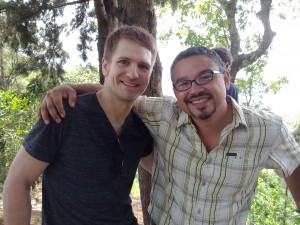 Hector was actually only two days removed from an appendectomy, so it was pretty awesome of him to come out. Hector’s farm lies between 1300 and 1515 m., fairly close to San Salvador. He grows pacamara and bourbon varietals, and processes his own coffee on an ecological mill, essentially a mechanically washed, or semi-washed coffee. It uses very little water, and involves no fermentation. Hector then dries on African raised beds initially, and switches to a concrete patio to finish. Overall, Hector had a pretty nice operation. It’ll be interesting to see how he does over the next few years.
Hector was actually only two days removed from an appendectomy, so it was pretty awesome of him to come out. Hector’s farm lies between 1300 and 1515 m., fairly close to San Salvador. He grows pacamara and bourbon varietals, and processes his own coffee on an ecological mill, essentially a mechanically washed, or semi-washed coffee. It uses very little water, and involves no fermentation. Hector then dries on African raised beds initially, and switches to a concrete patio to finish. Overall, Hector had a pretty nice operation. It’ll be interesting to see how he does over the next few years.
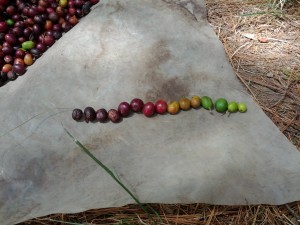 After spending some time wandering the farm and watching Hector and his crew mill some coffee, we had some lunch (and beer), and it was time to leave. Up next? A long drive to the north end of the country, to a town called La Palma. We got there well after dark, checked into a little mountain resort, and had dinner. Papusas, among other things, and beer. As well as a couple of beers at the bar afterwards. I swear, we really did work hard during this trip. Off to bed…
After spending some time wandering the farm and watching Hector and his crew mill some coffee, we had some lunch (and beer), and it was time to leave. Up next? A long drive to the north end of the country, to a town called La Palma. We got there well after dark, checked into a little mountain resort, and had dinner. Papusas, among other things, and beer. As well as a couple of beers at the bar afterwards. I swear, we really did work hard during this trip. Off to bed…
Tuesday:
This day started off pretty sweet. Olivier (who has a bike shop/roastery up in Minnesota, and who happens to be a pretty elite cyclocross guy) and I went for a run around the resort compound, which was about 100 acres. Only got to do about 5 miles, but the scenery as the sun came up in the mountains was pretty awesome. Misty mountains and the whatnot. And let me tell you, I may run far, but Oli runs fast…
After a quick breakfast, we headed out to Finca La Roxanita. This farm’s owner, Don Nacho, won the 2011 El Salvador Cup of Excellence competition, which means three things: 1. He’s growing some awesome coffee. 2. Everybody wants his coffee. 3. The price he’s getting for his coffee is officially insane. His mill operation was extremely clean, which is one of the most important things. In addition, he was drying exclusively on raised African Beds, another big plus. Another thing we noticed was that Finca La
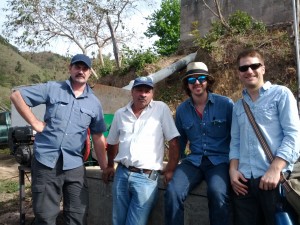
Roxanita was one of the only farms we saw that was doing special prep natural processed coffee, during which the coffee cherries are not depulped, but allowed to dry while still in the cherry. The drying cherries look a little like raisins. Most farms in Central America process their seconds (or coffee that was not ripe) this way, resulting in inferior coffee that is sold in the local market. However, if you apply this process to red, ripe cherries, you can get a really fantastic end product, with notes of cognac, bourbon, dried fruit, etc. It’s pretty cool to see stuff like that going on.
We spent a couple hours talking to Don Nacho about everything from cultivation practices to why he got into coffee to why he named his farm “La Roxanita” (turns out its named after his daughter, who ran away with some guy. Too late to change the name now though…). Afterward, we headed over to a fairly new coop called ACPROA. This coop includes Finca La Roxanita, as well as many other small farms throughout the area.
Our biggest task at ACPROA was to cup through about 40 coffees! Easier said than done, especially when you’re used to cupping 4-8 different coffees in one sitting. Not to be discouraged, we pushed ahead.
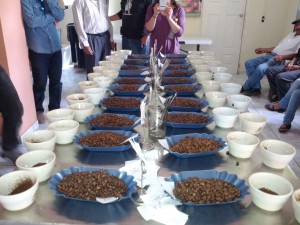
Let me tell you, cupping through that many coffees takes it out of you! In addition, it’s a little nerve-wracking cupping a bunch of coffees while all of the farmers are watching you! That being said, there were some really great coffees in there, and we’re hoping to bring several of them to you guys this year. Ideally, we’re looking at a “Tour of La Palma” series of coffees, showcasing had coffees grown in close proximity to each other can often taste massively different, due to varietal, micro climate, cultivation techniques, processing techniques, etc. Pretty cool stuff. Keep an eye out for it.
Anyway, after the cupping, we headed to a late lunch at Restaurant El Roble of vegetable soup and a simply amazing roasted chicken. Man, everything tastes better when your tired and hungry (and when it doesn’t come from a factory farm!).
After we refueled, we headed to another farm in the area, a well known, well-run place called Finca Los Planes. It’s owned by a guy named Sergio Ticas Reyes, and let me tell you, he’s growing some pretty fantastic coffee. Everything was clean and beautiful. Sergio grows primarily bourbon and pacamara (pretty standard for good farms in El Sal), but I’ve also heard rumors of orange bourbon, which is pretty rare. Didn’t see any, though.
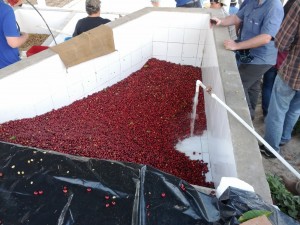 There were a few really cool things about Finca Los Planes, aside from the beautiful coffee trees and gorgeous hillsides. First, Finca Los Planes is a Rainforest Alliance certified farm, meaning they’ve done a lot to protect the ecological health of the farm and surrounding land. This year, they put in a new water recycling program, including a treatment tank that makes the waste water associated with coffee processing safe to go back into the water table.
There were a few really cool things about Finca Los Planes, aside from the beautiful coffee trees and gorgeous hillsides. First, Finca Los Planes is a Rainforest Alliance certified farm, meaning they’ve done a lot to protect the ecological health of the farm and surrounding land. This year, they put in a new water recycling program, including a treatment tank that makes the waste water associated with coffee processing safe to go back into the water table.
In addition, because of the very high altitude of the farm, after the cherries are pulped, they go into a tank for fermentation, but without water. I’ve personally never seen dry fermentation before. Pretty sweet.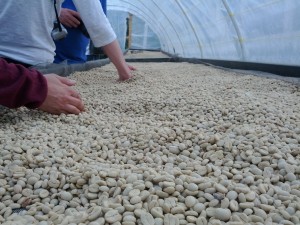
Lastly, Sergio has a beautifully constructed “greenhouse” that covers several raised African beds to facilitate the drying of the coffee. Again, something I haven’t seen before, and evidence that Sergio is really going all out to make some fantastic coffees.
From here, we were all extremely tired. We loaded up the bus and headed back to San Salvador, stopping for bit at an Italian (go figure) restaurant called Restaurant Al Pomodoro. Pizza and pasta, though it was pretty good. And the chocolate poached pears for dessert didn’t hurt. Man, what a long day.
Part 2 is on the way!
-Dave


